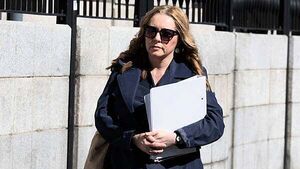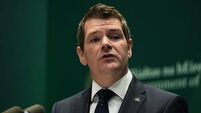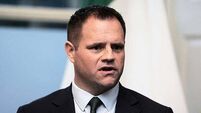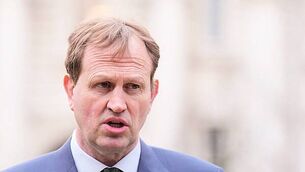Gerry Adams allegation was checked in 'good faith', BBC journalist tells court

High Court Reporters
A BBC journalist behind a programme at the centre of Gerry Adams’ defamation action against the broadcaster has refuted a suggestion she set about finding “yes men” to corroborate a claim that the former Sinn Féin leader sanctioned the killing of a British agent.
Jennifer O’Leary previously told the court the allegation – made to the BBC Spotlight programme by an anonymous contributor dubbed Martin – was corroborated by five different sources.
At the High Court on Thursday, during the third week of a civil trial hearing into Mr Adams’ action, the reporter said the allegation was checked in good faith, and in the public interest.
Mr Adams claims the Spotlight programme and a related article published in 2016 defamed him by falsely accusing him of sanctioning Mr Donaldson’s killing at a cottage in Glenties, Co Donegal in 2006.
The BBC denies it defamed Mr Adams, who insists he had no involvement in the death, which dissident republicans claimed responsibility for in 2009.
Continuing his cross-examination of Ms O’Leary on Thursday, Tom Hogan SC put it to the witness that she had set about finding “yes men” who would corroborate the allegation against Mr Adams, like disaffected republicans and indiscrete security services people.
She refuted this, and said she spoke to republican sources who supported the peace process, who did not hold animosity towards Mr Adams.
“I wasn’t going to any Tom, Dick or Harry, Mr Hogan, to check the journalism,” she said.
Mr Hogan put it to Ms O’Leary that she engaged in “ticking boxes”, by speaking to sources who wouldn’t contradict the allegation against Mr Adams, and receiving Mr Adams’ denial of the allegation.
With boxes ticked, she was able to publish the allegation in the knowledge that she wouldn’t have to stand over the allegation, he claimed.
Ms O’Leary said she didn’t agree with the premise of the question, and said she could absolutely stand over her journalism.
Mr Hogan suggested to the witness that she didn’t make the allegation against Mr Adams “bona fide”. She said the journalism was done in good faith, the allegation was checked in good faith, and in the public interest.
Counsel suggested she made the allegation recklessly. “It wasn’t an allegation made by me. It wasn’t an allegation taken or treated recklessly,” she said.
Ms O’Leary agreed that numerous times, it was put to Mr Adams that he never previously took legal action over allegations made against him in the past. Mr Hogan put to the witness that she could say anything about Mr Adams, because he wouldn’t sue.
In response, Ms O’Leary said this was an “outrageous and wrong suggestion” to make.
“Everybody that features in a BBC story is treated in the exact same way,” she said. In making a serious allegation about Gerry Adams, Ms O’Leary said she wasn’t given “carte blanche” to do so because he “hadn’t sued before”.
“That is not the case whatsoever,” he said.
Mr Hogan said that in dismissing previous allegations made by the likes of Sean MacSiofán, Dolours Price or “any disaffected IRA man or woman”, he was able to explain why they might make such an allegation, because he knew their identity.
He said this was not the case with Martin – a single, anonymous person making an unsubstantiated allegation out of the blue.
Explaining why Martin had to be anonymous, Ms O’Leay said that in 2015, according to a PSNI/MI5 report, IRA men were trying to identify “human intelligence” sources. She said “you can be sure” that there would be an interest in identifying Martin, “who was talking about his experience about being an informer”.
She noted the potential consequences of his identification, including trauma and grief to his family. “That is the reason why he had to be anonymous,” he said.
Ms O’Leary was also asked about the related BBC News article Mr Adams is suing over. Ms O’Leary previously told the court she didn’t write the article, although it was based on her journalism.
Ms O’Leary has now completed her evidence. Gweyneth Jones, who was deputy editor of Spotlight at the time the programme was published, is now giving evidence.
The trial, before Mr Justice Alexander Owens, continues.




